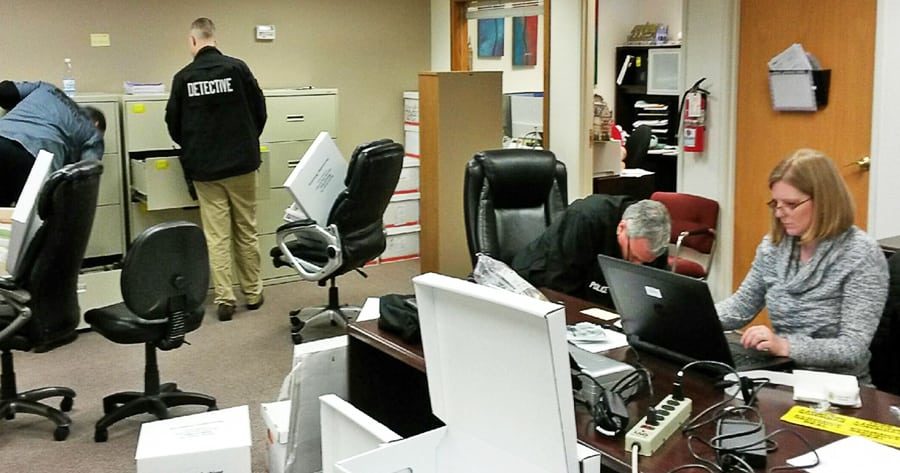
Home » Special criminal investigations unit takes aim at insurance fraud
Special criminal investigations unit takes aim at insurance fraud

March 15, 2017
Ten percent of all insurance claims are fraudulent. And 10 percent of the cost of all premiums is due to fraud.
This number is likely to increase as insurance fraud cases continue to grow, said Mark Couey, director of the Criminal Investigations Unit at the state Office of the Insurance Commissioner.
[blockquote quote="To report insurance fraud, call 360-586-2566 or visit insurance.wa.gov/complaints-and-fraud." align="right" max_width="300px"]
Insurance fraud is the second most-costly white-collar crime in the U.S., behind tax evasion.
The total cost of non-health insurance fraud is estimated at more than $40 billion per year, meaning the average U.S. family pays between $400 and $700 per year in increased premiums.
“It has gone up. We are seeing an increase,” Couey said. “Everybody has to buy insurance. If someone is stealing from an insurance company, the company is forced to raise insurance premiums and it affects all of us.”
Calls to the state agency for service or referrals have increased by more than 16 percent in the past two years.
In 2016, the office received 1,879 calls, up from 1,692 calls in 2015 and 1,611 calls in 2014.
“We’re constantly triaging and trying to focus on the largest or most complicated cases,” Couey said. The CIU at the insurance commissionaires office is staffed by Couey, two prosecutors, two criminal analysts, a detective sergeant, an administrative assistant and a team of detectives.
He links the increased fraud cases to several factors, including the state’s rapid population growth and the rise of “pay as you crash” cases, where an uninsured person buys an insurance policy at the time of a crash and submits a claim days later.
“With the emergence of smartphones and with the ability to purchase insurance online on your smartphone, some people will not buy insurance until they have crashed their car. They will purchase it on the spot,” Couey said. “There is definitely a red flag that is raised, but due to the volume of claims and policies coming through, some don’t get caught or maybe they just don’t understand how it works, so they get away with it.”
From January 2015 to December 2016, the Criminal Investigations Unit worked on more than 200 cases, resulting in 40 criminal charges and 37 adjudications. The special unit has a 95 percent success rate once a case is submitted to the prosecutor, Couey said.
The unit even has a list of insurance fraud’s most wanted fugitives posted on its website.
“Fraud runs a gamut. We see everything from a false stolen vehicle report or cars being driven into lakes or burned, exaggerated claims as a result of homeowner’s policy, like falsely claiming burglary of valuable possessions like diamond rings or TVs,” Couey said. “Or even medical providers falsely reporting medical services, or an insurance agent might collect premium funds but won’t actually process the policy. They’ll make up a fake document.”
The unit identifies and investigates insurance fraud by organizations and individuals, including medical fraud, staged auto collisions, property and inflated bodily injury claims, and other types of fraud.
“Greed, envy and jealousy are alive and well. We have investigated cases where a suspect was earning $30,000 a year in income, but we have also investigated and prosecuted cases where the suspect was an attorney and doctor. Greed isn’t determined by income level,” he said.
Tri-City cases
Couey said cases like Michelle Granberry of Kennewick and former insurance agent Philip Snider are not uncommon.
Granberry, 43, of Kennewick, was found guilty in December 2016 in Benton County Superior Court for filing a false insurance claim. She was sentenced to 90 days in jail, starting in January and has to pay $800 in various court fees.
Granberry had filed a claim with her insurance company, USAA, for damage to the back of her vehicle that occurred when her garage door hit her car while she was backing out of her garage on Aug. 14, 2015.
She then asked for reimbursement of her medical bills by claiming to her insurance company that she had aggravated a previous back injury while trying to lift the garage door off her car. She submitted medical bills from Kadlec Health System dated Aug. 7 totaling more than $13,000 for treating her back injury and then tampered the documents to make it seem like the injury happened Aug. 14, the day of her accident.
Snider, a former Kennewick insurance agent with Terry L. Johnson Insurance, wrote an Allstate homeowner policy for himself for a house he was buying in early 2013. Three days after he bought the home on Feb. 15, the home underwent extensive water damage during renovation.
That evening, Snider went into his office after it had closed for the day and lowered his homeowner policy deductible from $5,000 to $500. The next day, Snider filed a $37,000 claim with Allstate for the damage. Allstate ended up paying Snider $4,500 he was not entitled to because he fraudulently modified the deductible.
Snider was charged in Benton County Superior Court with second-degree theft, a felony. In August, he pleaded guilty to a reduced gross misdemeanor charge of misrepresentation in application for insurance.
“It’s called white-collar crime because it involves someone who ais really thinking about what they’re doing and we have to prove knowledge or intent. This isn’t someone who made a mistake on a paper. This is someone who planned it, forged receipts and repeated lies,” Couey said.
Consumers can report insurance fraud on the insurance commissioner’s website at insurance.wa.gov/complaints-and-fraud.
Local News Insurance
KEYWORDS march 2017




